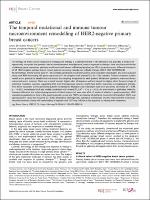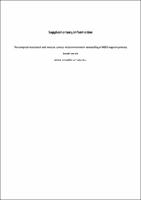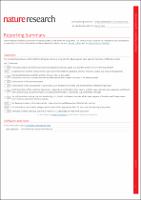| dc.contributor | Vall d'Hebron Barcelona Hospital Campus |
| dc.contributor.author | De Mattos-Arruda, Leticia |
| dc.contributor.author | Cortés Castan, Javier |
| dc.contributor.author | Blanco-Heredia, Juan |
| dc.contributor.author | Tiezzi, Daniel G. |
| dc.contributor.author | Gonçalves Ribeiro, Samuel |
| dc.contributor.author | Ortega Cebrian, Vanesa |
| dc.contributor.author | Cusco Pons, Pol |
| dc.contributor.author | Fasani, Roberta |
| dc.contributor.author | Nuciforo, Paolo Giovanni |
| dc.contributor.author | Rubio Rodríguez, Isabel Teresa |
| dc.contributor.author | Villacampa Javierre, Guillermo |
| dc.contributor.author | Dienstmann, Rodrigo |
| dc.date.accessioned | 2022-01-11T12:01:23Z |
| dc.date.available | 2022-01-11T12:01:23Z |
| dc.date.issued | 2021-06-07 |
| dc.identifier.citation | De Mattos-Arruda L, Cortes J, Blanco-Heredia J, Tiezzi DG, Villacampa G, Gonçalves-Ribeiro S, et al. The temporal mutational and immune tumour microenvironment remodelling of HER2-negative primary breast cancers. NPJ Breast Cancer. 2021 Jun 7;7:73. |
| dc.identifier.issn | 2374-4677 |
| dc.identifier.uri | https://hdl.handle.net/11351/6759 |
| dc.description | Breast cancer; Cancer genomics; Tumour biomarkers |
| dc.description.abstract | The biology of breast cancer response to neoadjuvant therapy is underrepresented in the literature and provides a window-of-opportunity to explore the genomic and microenvironment modulation of tumours exposed to therapy. Here, we characterised the mutational, gene expression, pathway enrichment and tumour-infiltrating lymphocytes (TILs) dynamics across different timepoints of 35 HER2-negative primary breast cancer patients receiving neoadjuvant eribulin therapy (SOLTI-1007 NEOERIBULIN-NCT01669252). Whole-exome data (N = 88 samples) generated mutational profiles and candidate neoantigens and were analysed along with RNA-Nanostring 545-gene expression (N = 96 samples) and stromal TILs (N = 105 samples). Tumour mutation burden varied across patients at baseline but not across the sampling timepoints for each patient. Mutational signatures were not always conserved across tumours. There was a trend towards higher odds of response and less hazard to relapse when the percentage of subclonal mutations was low, suggesting that more homogenous tumours might have better responses to neoadjuvant therapy. Few driver mutations (5.1%) generated putative neoantigens. Mutation and neoantigen load were positively correlated (R2 = 0.94, p = <0.001); neoantigen load was weakly correlated with stromal TILs (R2 = 0.16, p = 0.02). An enrichment in pathways linked to immune infiltration and reduced programmed cell death expression were seen after 12 weeks of eribulin in good responders. VEGF was downregulated over time in the good responder group and FABP5, an inductor of epithelial mesenchymal transition (EMT), was upregulated in cases that recurred (p < 0.05). Mutational heterogeneity, subclonal architecture and the improvement of immune microenvironment along with remodelling of hypoxia and EMT may influence the response to neoadjuvant treatment. |
| dc.language.iso | eng |
| dc.publisher | Nature Research |
| dc.relation.ispartofseries | NPJ Breast Cancer;7 |
| dc.rights | Attribution 4.0 International |
| dc.rights.uri | http://creativecommons.org/licenses/by/4.0/ |
| dc.source | Scientia |
| dc.subject | Mama - Càncer - Tractament |
| dc.subject | Càncer - Aspectes genètics |
| dc.subject.mesh | Breast Neoplasms |
| dc.subject.mesh | /therapy |
| dc.subject.mesh | Neoadjuvant Therapy |
| dc.subject.mesh | Mutation |
| dc.title | The temporal mutational and immune tumour microenvironment remodelling of HER2-negative primary breast cancers |
| dc.type | info:eu-repo/semantics/article |
| dc.identifier.doi | 10.1038/s41523-021-00282-0 |
| dc.subject.decs | neoplasias de la mama |
| dc.subject.decs | /terapia |
| dc.subject.decs | tratamiento neoadyuvante |
| dc.subject.decs | mutación |
| dc.relation.publishversion | https://doi.org/10.1038/s41523-021-00282-0 |
| dc.type.version | info:eu-repo/semantics/publishedVersion |
| dc.audience | Professionals |
| dc.contributor.organismes | Institut Català de la Salut |
| dc.contributor.authoraffiliation | [De Mattos-Arruda L] IrsiCaixa, Germans Trias i Pujol University Hospital, Badalona, Spain. Germans Trias i Pujol Research Institute (IGTP), Badalona, Spain. Cancer Research UK Cambridge Institute, Robinson Way, Cambridge, UK. [Cortes J] Oncology Department International Breast Cancer Center (IBCC), Quiron Group, Barcelona, Spain. Medica Scientia Innovation Research (MedSIR), Barcelona, Spain. Medica Scientia Innovation Research (MedSIR), Ridgewood, NJ, USA. Breast Cancer Research program, Vall d’Hebron Institute of Oncology (VHIO), Barcelona, Spain. Universidad Europea de Madrid, Faculty of Biomedical and Health Sciences, Department of Medicine, Madrid, Spain. [Blanco-Heredia J] IrsiCaixa, Germans Trias i Pujol University Hospital, Badalona, Spain. Germans Trias i Pujol Research Institute (IGTP), Badalona, Spain. [Tiezzi DG] Cancer Research UK Cambridge Institute, Robinson Way, Cambridge, UK. Breast Disease Division, Ribeirão Preto School of Medicine, University of São Paulo, São Paulo, Brazil. [Villacampa G, Gonçalves-Ribeiro S, Cusco P, Fasani R, Dienstmann R, Nuciforo P, Rubio IT] Vall d’Hebron Institute of Oncology (VHIO), Barcelona, Spain. Vall d’Hebron Hospital Universitari, Barcelona, Spain. [Ortega V] Breast Cancer Research program, Vall d’Hebron Institute of Oncology (VHIO), Barcelona, Spain |
| dc.identifier.pmid | 34099718 |
| dc.identifier.wos | 000658754600001 |
| dc.rights.accessrights | info:eu-repo/semantics/openAccess |



